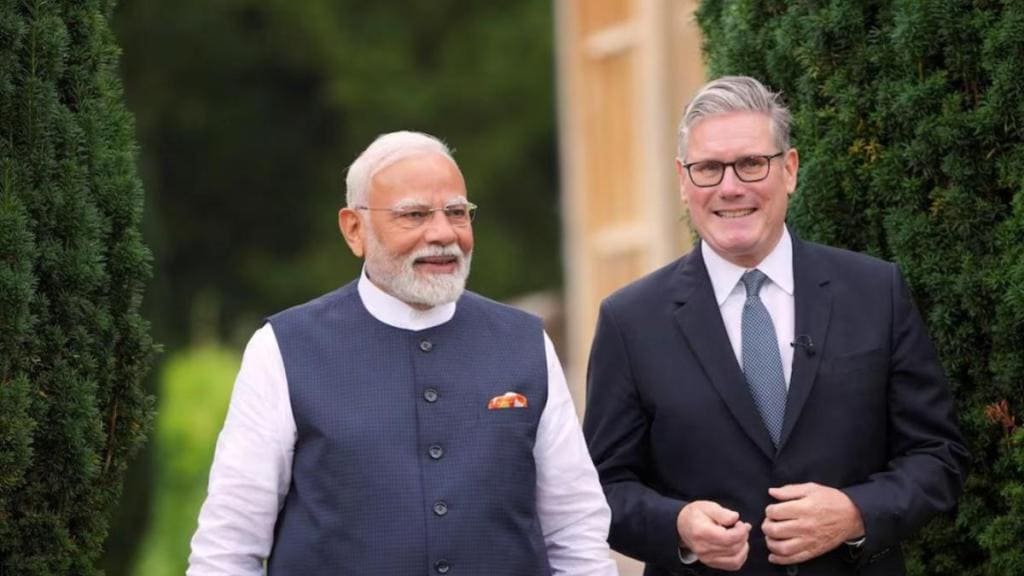Prime Minister Narendra Modi on Thursday said that the country is opening up the nuclear sector to the private players, inviting UK businesses to partner in the country’s green energy targets and infrastructure development. “I am pleased to announce that we are opening up the nuclear power sector to the private sector, and all this has created opportunities to take India-UK cooperation to new heights. I invite you to join India on this development journey,” Modi said while addressing the India-UK CEO Forum.
Policy shift and ambitious energy targets
The prime minister noted that infrastructure development is a priority for India and called for greater cooperation in green energy, critical minerals and rare earths.
“We are investing in next-generation physical infrastructure. We are rapidly progressing towards the target of 500 gigawatts of renewable energy by 2030…Let India and the UK set global benchmarks together,” he said.
At present, India’s RE capacity stands at 256 GW. The country further plans to increase it to 1800 GW by 2047.
“We must move forward in a structured manner in strategic sectors such as critical minerals, rare earths, and APIs. This will also give our relations a futuristic direction,” Modi said.
In Budget FY26, finance minister Nirmala Sitharaman announced a plan to set up a Nuclear Energy Mission for research and development of small modular reactors with an outlay of Rs 20,000 crore to be spent over the next few years.
The government has set a target of 100 gigawatts (GW) of nuclear energy by 2047, an ambitious one given that the installed strength of nuclear power in the country is just 8.1 GW or barely 2% of its total electricity-generation capacity.
Private Sector Rush
The government has also said that it will bring amendments to the Atomic Energy Act, 1962, and the Civil Liability for Nuclear Damage Act, 2010, to facilitate the entry of private companies in nuclear power generation. This comes seventeen years after a civil nuclear deal was struck between India and the US that made India a virtual member of the global nuclear club.
Following this, many Indian companies – state-run and private– have set their eyes on the sector. State-run NTPC, an early mover, is already in talks with three American companies– NuScale Power, Westinghouse Electric Company and Holtec International – and Russia’a Rosatom for indigenous development of pressurised water reactors (PWR), it had earlier told FE.
L&T and Tata Consulting Engineers too are looking at collaborating with Holtec, which has got the US Department of Energy approval for transfer of the flexible and cost-effective small modular reactors (SMR) technology to India. State-run oil marketing company IndianOil also will be entering the nuclear sector “sometime in the near future.”
NTPC alone is aiming to commission 30 GW of nuclear capacity by 2047, a company official had told FE earlier.
State-run Nuclear Power Corporation of India (NPCIL) has been the lone commercial player in the country to undertake nuclear power ventures, and the entire extant capacity belongs to it. The Bhabha Atomic Research Centre, Indira Gandhi Centre for Atomic Research, and the Indian Rare Earths have their feats of strength, but are yet to have the required synergies with the private sector.
Tata Power has also said that it is under discussions with many states, including Orissa, Madhya Pradesh, and Gujarat, to identify suitable land parcels for its nuclear power plants.
India has a plan to nearly triple its nuclear power capacity to 22.8 Gw by FY32 with 10 plants under construction. NTPC is now building nuclear plants with 2.8 GW capacity in collaboration with NPCIL in Rajasthan. NTPC has formed a wholly-owned subsidiary, NTPC Parmanu Urja Nigam to undertake nuclear projects and is looking to develop plants across many states .


